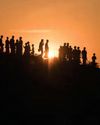
For John Folkes, it all began with a simple command, and a blinding flash. It was September 1956, and he was flying 18,000ft over Maralinga, Australia, secured in his seat by a single lap and shoulder strap, when a 15 kiloton atomic device – as powerful as the weapon that had devastated Hiroshima a decade before – was detonated over the desert plains below.
Two days earlier, the 19-year-old had been told that his job was to head directly into the mushroom cloud and collect a sample of the radiation released by the blast. The flash blazed beneath him, forming an image that would terrorise Folkes’s dreams for the remainder of his life: it was “an inferno”, he recalls, describing “crimson and black smoke billowing up towards us”.
“The cloud was rising, it was coming up faster than we expected, but there was no turning round, no brakes on a plane. That’s when I thought ‘We’re not going to make it.’”
They sped up. Suddenly, all the gauges in the cockpit were spinning out of control. Folkes shared a look with the pilot. “No more than four seconds later, we were hit with this enormous shockwave, which flipped the aircraft over on its back, leaving me suspended in the air on these straps.” Unfathomably, they made it safely to the ground – “By the hand of God,” says Folkes, who is now 89 and lives in Thanet. The moment he stepped off the plane, his hands began violently shaking, and they haven’t stopped since.
Folkes was working as part of Operation Buffalo, carried out by the UK’s Atomic Weapons Establishment. He was just one of thousands of young men whose lives were treated as little more than collateral damage in Britain’s race to become a global nuclear power.
この記事は The Independent の November 12, 2024 版に掲載されています。
7 日間の Magzter GOLD 無料トライアルを開始して、何千もの厳選されたプレミアム ストーリー、9,000 以上の雑誌や新聞にアクセスしてください。
すでに購読者です ? サインイン
この記事は The Independent の November 12, 2024 版に掲載されています。
7 日間の Magzter GOLD 無料トライアルを開始して、何千もの厳選されたプレミアム ストーリー、9,000 以上の雑誌や新聞にアクセスしてください。
すでに購読者です? サインイン

Why home advantage has lost its sting in Test series.
“The tour is only a matter of hours old, but the wry thought occurs to me that reputations will almost certainly be destroyed in the next few months.”

North can't compete with south's individual X factor
Ex-Lions captain Sam Warburton has a theory why southern hemisphere teams have dominated the autumn internationals

Aimless Villa stagger to bore draw against Juventus
Aston Villa and Unai Emery have run out of ideas, far too early in the Spaniard’s previously exhilarating revolution.

Reds humble Real and Slot does what Klopp could not
A few weeks ago, it was possible to look at Arne Slot’s seemingly impressive start at Liverpool, adopt a sceptical tone and ask who they had really beaten.

Vauxhall's closure shows No 10 must recharge EV rules
Electric vehicles aren't selling in the volume anticipated and James Moore says government is right to order a swift review

Nationwide banks £2bn in takeover of Virgin Money
Nationwide has gained £2.3bn following its acquisition of Virgin Money, according to the firm’s half-year results.

Red Sea boat survivors were trapped in cabins, says diver
Two Britons who were on the yacht remain unaccounted for

Record snowfall leaves Seoul scrambling to cope
Transport chaos and power cuts hit city as two die on roads

Myanmar junta chief faces crimes against humanity charge for Rohingya deaths
Arrest warrant requested by International Criminal Court

Lebanon ceasefire is part of plan to keep Trump on side
Benjamin Netanyahu knows the incoming president won't be happy if the Gaza war drags on, writes Chris Stevenson, so he is turning his attention to Iran to buy himself some time